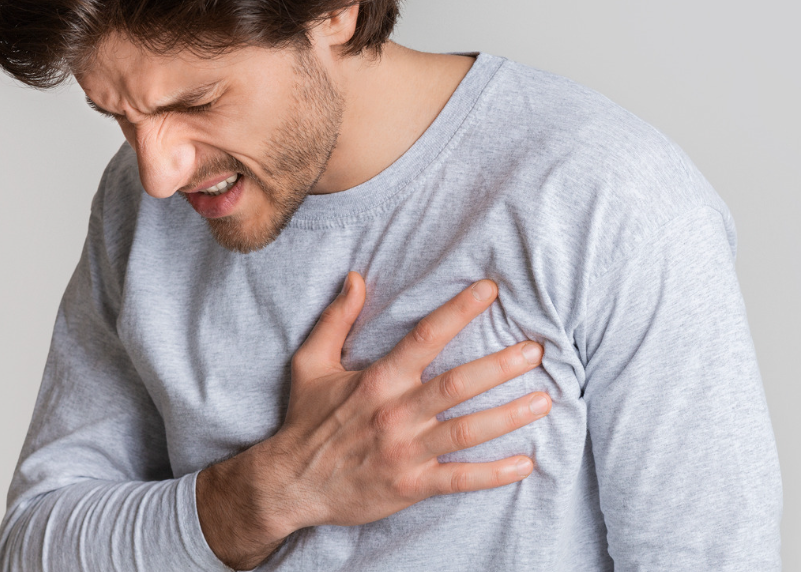Heart Health
Decoding Sharp Chest Pain and Its Hidden Messages
Experiencing sharp chest pain can be a cause for concern, as it may indicate a serious underlying condition.
In this informative article, we delve into the intricacies of sharp chest pain and decode its hidden messages. As an authoritative and patient-centric source of health information, we aim to provide you with a clear understanding of the potential causes and associated symptoms of sharp chest pain. Our comprehensive approach, supported by medical expertise, ensures that you are equipped with the knowledge to make informed healthcare decisions. Stay tuned to uncover the truth behind sharp chest pain.

Common Causes of Sharp Chest Pain
Sharp chest pain can indicate a variety of diseases, ranging from minor to life-threatening. The following are some of the most common reasons of sharp chest pain.
Cardiovascular Conditions
Sharp chest pain may be caused by the following cardiovascular conditions:
- A heart attack happens when blood flow to the heart is obstructed, causing damage to the heart muscle. Chest pain is a common sign of a heart attack, and it is typically described as an intense, crushing ache in the middle of the chest that can radiate to the arms, neck, jaw, or back.
- Angina is a type of chest pain caused by the heart muscle not receiving enough blood and oxygen. It is commonly described as a squeezing or pressure-like sensation in the chest, which can also be felt in the arms, neck, jaw, shoulder, and back.
- Pericarditis is an inflammation of the pericardium, or the sac that surrounds the heart. Pericarditis is characterized by acute, stabbing pain in the center or left side of the chest.
- Aortic dissection is a tear in the inner layer of the aorta, the primary artery that transports blood from the heart to the rest of the body. Chest pain is a common symptom of aortic dissection, and it is typically described as a severe, tearing agony in the chest, back, or belly.
Respiratory Issues
The following respiratory disorders might produce acute chest pain:
- A pulmonary embolism happens when a blood clot enters the lungs and stops blood flow. Chest pain is a common symptom of pulmonary embolism, and it is typically described as a sharp, stabbing pain in the chest or back.
- A pneumothorax occurs when air enters the gap between the lungs and the chest wall, causing the lung to collapse. Chest discomfort is a common symptom of a pneumothorax, and it is typically described as a sharp, stabbing pain in the chest or shoulder.
Gastrointestinal Problems
Sharp chest pain can be caused by the following gastrointestinal problems:
- Gastroesophageal reflux disease (GERD) occurs when stomach acid rushes back into the esophagus, causing irritation and inflammation. Chest pain is a common GERD symptom, and it is typically described as a burning or pressure-like discomfort in the chest or neck.
- Heartburn is a GERD symptom that is commonly described as a burning or uncomfortable sensation in the chest, which may be accompanied by a sour taste in the mouth.
Musculoskeletal Causes
Sharp chest pain can be caused by musculoskeletal conditions, such as:
- Muscle tension can occur in the chest muscles, resulting in acute or stabbing pain.
- Chest pain can also be caused by a chest injury, such as a broken rib or a bruised muscle.
If you have intense chest pain, seek medical assistance immediately because it may indicate a serious condition.

Symptoms Accompanying Sharp Chest Pain
Sharp chest discomfort can be a sign of a variety of medical disorders, and it is critical to recognize the associated symptoms in order to diagnose the underlying reason. The following subsections will go over the various symptoms that might accompany intense chest pain.
Heart-Related Symptoms
Sharp chest pain with shortness of breath, sweating, nausea, dizziness, and weariness may suggest a cardiac condition. These symptoms may be indicative of a heart attack, angina, or pericarditis. A heart attack is a medical emergency that requires rapid treatment. If a person develops these symptoms, they should seek medical assistance immediately.
Respiratory Symptoms
Sharp chest pain coupled by coughing, shortness of breath, and wheezing could suggest a respiratory condition. These symptoms could imply pneumonia, bronchitis, or asthma. If a person has these symptoms, they should seek medical assistance.
Other Symptoms
Sharp chest pain along with other symptoms such as fever, chills, and body aches could indicate an infection. These symptoms could indicate pneumonia, bronchitis, or another respiratory infection. If a person has these symptoms, they should seek medical assistance.
In conclusion, acute chest pain can be a sign of a variety of medical disorders, and it is critical to identify the associated symptoms in order to discover the underlying reason. If a person suffers sharp chest discomfort combined with any of the symptoms listed above, they should seek medical assistance immediately.

When to Seek Emergency Medical Care
Sharp chest discomfort can indicate a severe and abrupt medical emergency that necessitates rapid treatment. In such instances, calling 911 or visiting the emergency room is critical.
If the intense chest pain is accompanied by any of the following symptoms, it is critical to seek emergency medical attention:
- Shortness of breath.
- Nausea or vomiting.
- Sweating
- Dizziness or lightheadedness.
- Fainting
- High Blood Pressure
These symptoms could signal a heart attack, which is a medical emergency that requires immediate attention.
If the sharp chest pain is sudden and strong and does not go away with rest or medicine, you should seek immediate medical assistance. This could be an indication of aortic dissection, which is a tear in the vessel that transports blood throughout the body.
To summarize, if someone has sudden, severe, and persistent intense chest pain combined with any of the symptoms listed above, they should seek emergency medical attention right away by dialing 911 or going to the local emergency department.

Diagnosis and Treatment of Sharp Chest Pain
Diagnostic Procedures
When someone has sharp chest pain, they should seek medical assistance immediately. To diagnose the reason of the pain, a healthcare provider will do a physical examination and obtain a medical history. They may also request diagnostic tests to assist with the diagnosis. A healthcare provider may order the following initial tests:
- Electrocardiogram (ECG or EKG): This rapid test evaluates the electrical activity of the heart. Electrodes are sticky patches that are implanted on the chest, arms, and legs. Wires link the electrodes to a computer that monitors the electrical activity of the heart.
- Blood testing can help determine whether there is an infection or some underlying issue causing the chest pain.
- Chest X-ray: This exam can detect any abnormalities in the lungs or heart that are causing chest pain.
- A CT scan or MRI may be requested if the healthcare professional detects a more serious issue, such as a blood clot or an aortic dissection.
Treatment Options
The underlying reason of intense chest pain determines the appropriate treatment. If the cause is a heart attack, the healthcare professional may prescribe drugs like nitroglycerin to help open the arteries and enhance blood flow to the heart. In some circumstances, surgery may be required to remove a blockage or repair heart damage.
If the source of the chest pain is not related to the heart, the healthcare professional may prescribe drugs or recommend over-the-counter pain killers to alleviate the discomfort. In some circumstances, physical therapy or other types of therapy may be prescribed to aid with pain management and overall health.
It is critical to follow the healthcare provider’s treatment recommendations and attend all follow-up sessions in order to track progress and ensure that the underlying problem is being managed appropriately.
Conclusion
Finally, deciphering severe chest discomfort and understanding its underlying messages is critical for preserving overall health and wellness. Sharp chest discomfort can result from a variety of causes, ranging from minor muscle strain to more serious problems such as heart attacks or pulmonary difficulties. Ignoring such indications can result in life-threatening scenarios.
As a result, when suffering intense chest pain, it is critical to pay close attention to the signals your body sends and seek medical attention as soon as possible, especially if it is accompanied by other alarming symptoms. Being proactive and knowledgeable enables you to make the best decisions for your health and ensure timely intervention when needed. Remember that your health is your top priority, and obtaining professional help can bring clarity and peace of mind when dealing with chest pain and its underlying causes.
Trusted Health, Wellness, and Medical advice for your well-being



